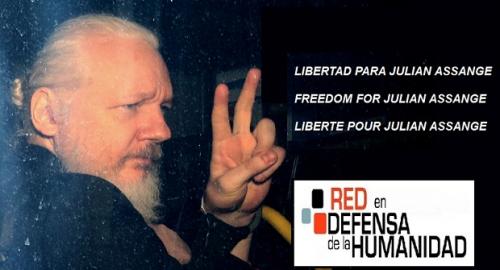Freedom for Julian Assange
- Declaración

In a public statement on November 1st, the United Nations Special Rapporteur on Torture, Nils Melzer, expressed "his alarm at the continued deterioration in the health of Julian Assange since his arrest and detention earlier this year”, stating that his life is now in danger.
In his May report, Melzer stated, in 20 years of working with victims of war, violence and political persecution, he had never seen a group of democratic states unite to isolate, demonize and deliberately abuse an individual for so long and without respecting human dignity or the rule of law. He said this after he met Assange with a specialized medical team at Belmarsh High Security Prison, in London.
One of the conclusions of the team was that the detainee "showed all the typical symptoms of prolonged exposure to psychological torture, extreme stress, chronic anxiety and psychological trauma".
In June 2012 Assange took refuge in the Ecuadorian embassy in London. In August, the government of President Rafael Correa granted him political asylum. His inability to leave, as he would be arrested and surely extradited to the United States, made him a prisoner. "The Ecuadorian nationality granted to him in December 2017 was not enough to change his situation.”
On April 11 of this year the new president of Ecuador, Lenin Moreno, at the request of the U.S. government, withdrew his asylum and nationality. Assange was then handed over to the British authorities who confined him in Belmarsh. Isolated, and without being able to prepare his defense, he is awaiting a trial that will decide his extradition to the United States where under the current charges he could be sentenced up to 175 years in prison.
Assange, editor of WikiLeaks, is accused by Washington of "conspiracy" and "espionage," having sent many media outlets in the world the "War Diaries.” These are thousands of military and diplomatic documents that expose multiple U.S. war crimes in Afghanistan and Iraq.
According to Melzer "While the U.S. government prosecutes Mr. Assange for publishing information on serious human rights violations, including torture and murder, officials responsible for these crimes continue to enjoy impunity.”
Among others, his work was recognized in 2011 with the Walkley Award for Outstanding Contribution to Journalism; the Martha Gellhorn Journalism Award; the Index of Censorship Award; The Economist's New Media Award; Amnesty International's New Media Award; and the 2019 Gavin MacFayden Award. WikiLeaks was also nominated in 2015 for the UN Mandela Prize and seven times for the Nobel Peace Prize (2010-2015 and 2019).
A few weeks ago a group of journalists and communicators started a campaign for his freedom. It states, "If the U.S. government can prosecute Julian Assange for publishing classified documents, it will clear the way for governments to prosecute journalists anywhere in the world, which would set a dangerous precedent against worldwide press freedom [...] In a democracy, it must be possible to reveal war crimes and cases of torture and abuse without having to go to jail. That is precisely the role of the press in a democracy.”
To date, not even a thousand journalists have responded to this call and very few human rights organizations have taken the defense of their case seriously.
Why this attitude towards Assange? Special Rapporteur Melzer has an explanation; "After being dehumanized through isolation, ridicule and shame, it was very easy to deprive him of his fundamental rights without provoking the indignation of world public opinion.”
An editorial in Le Monde Diplomatique in December 2018 says; "The persecution of Mr. Assange by the US authorities is encouraged by the cowardice of journalists who have left him to his fate, and even delight in his misfortune.”
Therefore, we, members of the Network in Defense of Humanity and those who would like to join this call, demand respect for due process, non-extradition and the immediate release of Julian Assange. We urge national and international organizations, intellectuals and journalists and their media to put an end to the campaign against this brave human being for the crime of revealing war crimes against humanity. We demand that public opinion be truthfully informed about this terrible violation of his fundamental rights.
As the call from Journalists and Communicators says: "Dangerous times demands courageous journalism.”
Executive Secretariat of the Network in Defense of Humanity
Alicia Jrapko, EE.UU.
Anarella Vélez, Honduras
Ángel Guerra, Cuba/México
Antonio Elías, Uruguay
Arantxa Tirado, España
Ariana López, Cuba
Arnold August, Canadá
Atilio Boron, Argentina
Camille Chalmers, Haití
Carlos Alberto (Beto) Almeida, Brasil
Carmen Bohórquez, Venezuela
Dario Salinas Figueredo, Chile/México
Fernando León Jacomino, Cuba
Fernando Buen Abad, México/Argentina
Florencia Lagos, Chile
Gabriela Cultelli, Uruguay
Gilberto Ríos, Honduras
Hernando Calvo Ospina, Francia
Hildebrando Pérez Grande, Perú
Hugo Moldiz, Bolivia
Irene León, Ecuador
Javier Couso, España
Javiera Olivares, Chile
Katu Arkonada, País Vasco/México
Luis Hernández Navarro, México
Marcos Teruggi, Argentina/Venezuela
María Nela Prada, Bolivia
Marilia Guimaraes, Brasil
Nadia Bambirra, Brasil
Nayar López, México
Omar González, Cuba
Orlando Pérez, Ecuador
Pablo Sepúlveda Allende, Venezuela
Pasqualina Curcio, Venezuela
Paula Klachko, Argentina
Pedro Calzadilla, Venezuela
Ricardo Flecha, Paraguay
Sergio Arria, Venezuela/Argentina
Stella Calloni, Argentina
Tim Anderson, Australia
Network in Defense of Humanity, December 17, 2019
More signatures:
https://cuba-networkdefenseofhumanity.blogspot.com/2019/12/freedom-for-julian-assange.html
Del mismo autor
- ¡Cuba vence y vencerá! 12/07/2021
- Liberté pour Julian Assange 17/12/2019
- Freedom for Julian Assange 17/12/2019
- Libertad para Julian Assange 17/12/2019
- Condenamos enérgicamente el golpe de Estado contra el presidente Evo Morales 11/11/2019
- Alerta sobre violación a los derechos humanos en Ecuador 09/10/2019
- Alert about the ‘State of Exception’ in Ecuador 06/10/2019
- Alerta sobre Estado de Excepción en Ecuador 06/10/2019
- Let’s save the Amazon! Let’s save the planet! 29/08/2019
- ¡Salvemos la Amazonia! ¡Salvemos el planeta! 29/08/2019
Clasificado en
Clasificado en:
Julian Assange
- Craig Murray 15/03/2022
- Peoples Dispatch 15/02/2022
- Jake Johnson 24/01/2022
- Anish R M 17/01/2022
- RBA 04/01/2022








